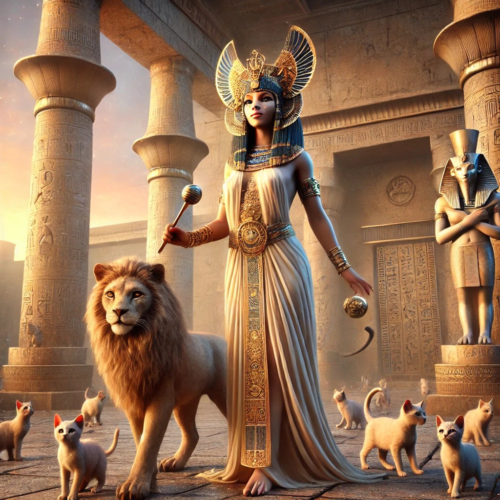Bastet, also known as Bast, is one of the most beloved goddesses in ancient Egyptian mythology. She is often depicted as a lioness or a woman with the head of a lioness, symbolizing her dual nature as both a fierce protector and a bringer of joy. Bastet is the goddess of home, fertility, childbirth, and is also associated with music, dance, and domestic cats.
Bastet was first worshiped as a lioness goddess, a fierce protector who guarded the pharaoh and the land of Egypt. Over time, her image softened, and she became associated with the protection of the home and family. She was believed to safeguard households from harm, driving away evil spirits and ensuring the well-being of those within her domain. Despite her gentler image, Bastet never lost her strength, remaining a guardian who could unleash her wrath on those who threatened her people.
Bastet is not just a protector; she is also a goddess of celebration and happiness. She is often depicted holding a sistrum, an ancient musical instrument, emphasizing her connection to music, dance, and festivity. The ancient Egyptians held grand festivals in her honor, where people would gather to sing, dance, and make offerings. These celebrations brought communities together, and Bastet’s presence was invoked to bring joy, prosperity, and harmony.
As a goddess of fertility, Bastet was closely connected to childbirth and new life. Women prayed to her for safe deliveries and healthy children. She was also associated with abundance and growth, symbolized by her frequent depiction surrounded by kittens. These images not only highlighted her protective nature but also celebrated her role as a bringer of life and prosperity.
Bastet’s transformation into the goddess of domestic cats solidified her place in the hearts of the ancient Egyptians. Cats were highly valued in Egyptian society, seen as protectors of the home due to their ability to hunt vermin. Bastet’s association with cats elevated their status to sacred animals, believed to bring good luck and protection. Killing a cat, even accidentally, was considered a grave crime, punishable by law.
Cats became symbols of Bastet’s presence, and families often kept them as a way to honor the goddess. Many households also made offerings to Bastet in the form of small cat statues or amulets, seeking her blessings for prosperity and protection.
Bastet’s popularity endured throughout ancient Egypt’s history, and her dual nature—both fierce and nurturing—made her a relatable and beloved deity. Her connection to cats, joy, and family has ensured her legacy remains alive in modern culture. Bastet’s story reflects the ancient Egyptians’ deep respect for the balance between strength and compassion, protection and celebration.

